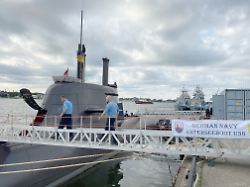Baltic Sea exercise “Northern Coasts”
German Navy chief: Major maneuvers are a signal to Moscow
September 8, 2023, 7:10 p.m
Listen to article
This audio version was artificially generated. More Info | Send feedback
The “Northern Coasts” military exercise will start in the Baltic Sea next week. A total of 14 countries are taking part. For Germany’s navy chief, the maneuver also sends a “clear signal to Russia.”
The German leader expects the large-scale “Northern Coasts” exercise, which will soon begin in the Baltic Sea, to proceed smoothly. “It is well prepared,” said Flotilla Admiral Stephan Haisch on board the frigate Hamburg in the port of Riga. He also doesn’t expect any provocation from the Russian Navy. They are aware of the maneuver, which has been taking place on Germany’s initiative since 2007. If you get too close at sea, there are opportunities to communicate.
According to the Navy, more than 3,000 soldiers from 14 countries will be taking part in the exercise for two weeks starting next week, including those bordering the Baltic Sea, Italy, France, Canada and the USA. Around 30 ships and boats – including a submarine, around 20 aircraft and various land units – belong to the maneuver group. The area of the exercise led from Rostock is said to include the coastal waters and land and airspace of Estonia and Latvia as well as the eastern and central Baltic Sea. For the first time, “Northern Coasts” will be based on an alliance defense scenario.
According to the head of the German Navy, the maneuver is also intended to be a pointer to Moscow. “We are sending a clear signal to Russia that all partners are vigilant,” said Naval Inspector Jan Christian Kaack. Haisch said that even after Moscow’s attack on Ukraine, the Russian marina in the Baltic Sea was behaving normally as in previous years. “We don’t experience any provocation. People behave in a very clean manner, without getting too close. They greet each other in a friendly manner.” But there is already increased attention.
According to Haisch, the biggest challenge in the maneuver is the interoperability of so many units from 14 nations. “The fact that we can all really practice together, that we can communicate with each other, that we have the same picture of the situation – that will be the biggest challenge.” Latvian navy chief Maris Polencs said Moscow’s attack on Ukraine had led to a reassessment of possible threats. He spoke of the need to invest more time and money in equipment and skills development.
